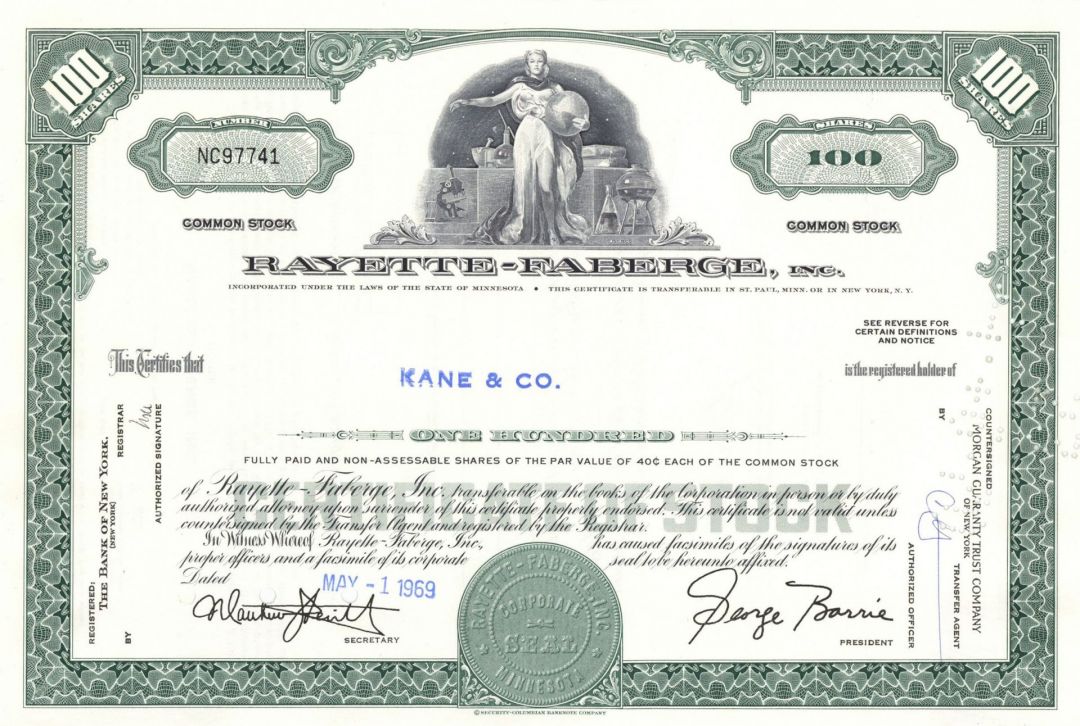Rayette-Faberge, Inc. - Printed Signature of George Barrie - 1960's dated Cosmetic Stock Certificate
Inv# GS1219 StockNew York
Cosmetic Stock printed by Security-Columbian Banknote Company. Vignette of female figure holding a globe. Microscope, mortar & pestle, books, etc.
Fabergé, a renowned brand of cosmetics, was manufactured between 1964 and 1984 under the leadership of George Barrie. However, in 1984, McGregor Corporation acquired Fabergé and discontinued many of its products. In 2007, the trademarks, licenses, and rights were transferred to Fabergé Limited, a company based in the Cayman Islands. Mark Dunhill was appointed as the CEO, and Fabergé Limited announced its intention to transform the brand into a luxury goods company.
During his business ventures in communist Russia in the 1920s, American oil billionaire Armand Hammer amassed a collection of Fabergé pieces. In 1937, Hammer’s friend Samuel Rubin, the owner of the Spanish Trading Corporation, which imported soap and olive oil, closed down his company due to the Spanish Civil War. Rubin then established a new enterprise to manufacture perfumes and toiletries. At Hammer’s suggestion, he registered the company as Fabergé, Inc. The Fabergé family remained unaware of this until after World War II ended. Unable to afford prolonged and costly litigation, they settled out of court in 1951 for a mere US$25,000 ($250,000 today), allowing Fabergé to be used in connection with perfume. Soon after, Rubin expanded the Fabergé brand to include cosmetics and toiletries, which were typically sold in upscale department stores. Fabergé achieved a high level of prestige, comparable to its competitors such as Coty, Guerlain, and Elizabeth Arden.
George Barrie, born on February 9, 1912, and passing away on November 16, 2002, held the esteemed position of owner and CEO of Fabergé Inc. from 1964 to 1984. His contributions extended beyond the realm of jewelry, as he was nominated for two Oscars for Best Original Song and played a pivotal role in creating the renowned cologne Brut. While not among the pioneers in using celebrities for advertising, Barrie significantly contributed to its widespread adoption.
Raised in Pittsfield, Massachusetts, Barrie’s early life was marked by his Jewish heritage. Initially trained as a musician, he found himself in need of a stable income during the 1930s and took a salesman job with the hair products company Rayette.
In 1964, Barrie and Rayette embarked on a remarkable journey by purchasing Fabergé Inc. for a substantial $26 million. This acquisition paved the way for the international success of the Brut line of perfumes and hair care products.
Barrie’s pioneering spirit extended to the realm of celebrity endorsements. He skillfully wooed a diverse range of stars, including Cary Grant, Farrah Fawcett, Joe Namath, Roger Moore, Muhammad Ali, Margaux Hemingway, and Laurence Harvey, to promote their company products.
Beyond his business acumen, Barrie and his Brut Productions collaborated on several successful films. Their most notable creation was the 1973 film “A Touch of Class,” starring Glenda Jackson and George Segal. Additionally, they produced “Night Watch” (1975), “Whiffs” (1975), “Sweet Hostage” (1975), “Thieves” (1977), “Nasty Habits” (1977), and “Fingers” (1978).
A stock certificate is issued by businesses, usually companies. A stock is part of the permanent finance of a business. Normally, they are never repaid, and the investor can recover his/her money only by selling to another investor. Most stocks, or also called shares, earn dividends, at the business's discretion, depending on how well it has traded. A stockholder or shareholder is a part-owner of the business that issued the stock certificates.











Ebay ID: labarre_galleries